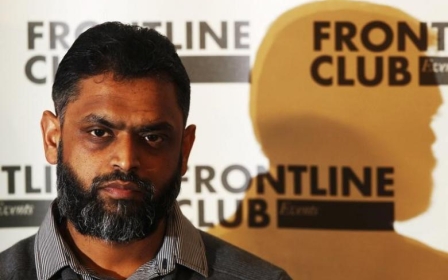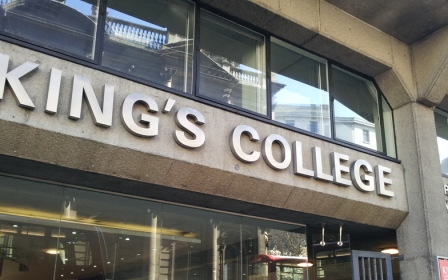Students fear crackdown on Palestine activism on UK campuses

Pro-Palestine activists on British university campuses fear a crackdown is taking place against them following the cancellation of several events affiliated to the Israeli Apartheid Week initiative and increasing regulation and monitoring of their activities.
The concerns come with universities under mounting pressure to demonstrate compliance with the government's Prevent counter-terrorism strategy, and university staff advised to "risk-assess and manage" Palestine-related activism as part of their Prevent Duty responsibilities.
"Vocal support for Palestine" and "Opposition to Israeli settlements in Gaza" are included in a list of "contentious topics" in the presentation on a website, Safe Campus Communities, created for university staff to help them fulfil their Prevent Duty obligations.
At least two events linked to Israel Apartheid Week have been cancelled or postponed this week, including a lecture hosted by the Palestine society at the University of Central Lancashire (UCLan) and an Israeli checkpoint stunt at the University of Exeter.
The cancellations also sparked fears about freedom of speech on campus after more than 200 academics, including 100 professors, signed an open letter condemning attempts to silence campus discussion about Israel and its treatment of Palestinians.
Checkpoint event halted
Students at Exeter University were told that their checkpoint stunt had been cancelled because the activity could be deemed "discriminatory and considered harassment against certain students".
"The student guild approved it on safety grounds but for the first time in 14 years the university denied our permission by saying in a letter that the stunt could be illegal," said Gabriel, a student at Exeter.
"The university did not give us a chance to suggest alternative arrangements and gave a blanket ban saying there was no way our event can be allowed to take place."
"The university did not give us a chance to suggest alternative arrangements and gave a blanket ban saying there was no way our event can be allowed to take place"
Exeter University said it had cancelled the checkpoint stunt because it was "planned in a very busy part of campus."
A spokesman also added: "Had the Friends of Palestine Society proposed alternative venues we would have considered them."
At UCLan, Anum Riaz, the president of its Friends of Palestine Society, told Middle East Eye that the "university was not being transparent" and said officials had not explained why the event had been cancelled.
According to Riaz, university officials cited different reasons ranging from the society not following UCLan's protocols to the event not having a balanced panel.
Riaz also told MEE that a university official had said that the event had contravened the government's new definition of anti-Semitism, which critics say equates criticism of Israel to anti-Semitism.
UCLan said it was committed to creating a diverse campus and that the proposed talk was cancelled because it was not referred to the "designated event process in a timely manner and therefore could not go ahead".
But in previous statements made about the event, the university said it had banned the talk because it contravened the International Holocaust Remembrance Alliance's (IHRA) new definition of what constitutes anti-Semitism.
Risk assessments
Other methods used to curtail Palestine activists on campus according to activists include increased checks when attempting to bring in external speakers and booking rooms for events.
Millie Harris, a politics student at King's College London, told MEE that her Palestine society's events had been subject to increased vetting by the university.
"Two days before our events we've had to go through 'high-risk assessments' despite booking the events month in advance," said Harris.
"This adds extra pressure and stress on students involved in the society who are volunteers because we don't know if the event will be allowed to take place."
Harris also told MEE that their events were subject to repeated room changes, which costs the society money as they have had to reprint promotional material for their events.
King's responded by saying that it had changed venues for the event because the Palestine society had "changed the date of their scheduled event last week so the location was initially changed".
Harris hit back and said that the society had "changed the date for the event in January not last week."
Recording events
Several activists also told MEE that university senior management had sent representatives to monitor their activities and demanded that their events take place in rooms where events could be recorded.
Palestinian student Anis Mohamed who studies at University College London (UCL) spoke of how his institution had sent a student union representative to "monitor" a talk they hosted with humanitarian activist Dr Ang Swee.
"I can understand the safety side of it so that if anything happens ...they can refute it... at the same time we were recording the event and we made that clear so we weren't sure why they came down."
Speaking about the future of the Palestine movement on campus, Mohamed said that these efforts by the university to regulate Palestine activism could put people off joining the campaign.
The university told MEE that it did not send any staff members to monitor the Friend of Palestine society's events
It also denied asking the group to host their event in a lecture that could be recorded, stating that majority of its halls have recording capabilities.
Israeli Apartheid Week is held every year on campuses across the world and aims to draw parallels between the Israeli occupation of the West Bank and apartheid-era South Africa.
The Palestine movement has gained traction across UK campuses with student unions passing motions urging universities to divest from companies complicit in the illegal Israeli occupation of the West Bank.
Editor's Note: Some names have been changed
Middle East Eye propose une couverture et une analyse indépendantes et incomparables du Moyen-Orient, de l’Afrique du Nord et d’autres régions du monde. Pour en savoir plus sur la reprise de ce contenu et les frais qui s’appliquent, veuillez remplir ce formulaire [en anglais]. Pour en savoir plus sur MEE, cliquez ici [en anglais].




